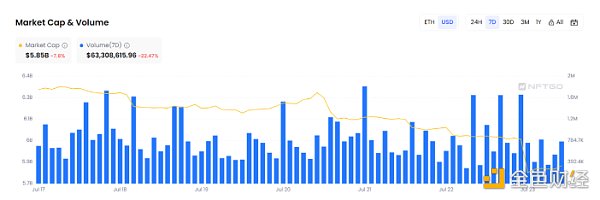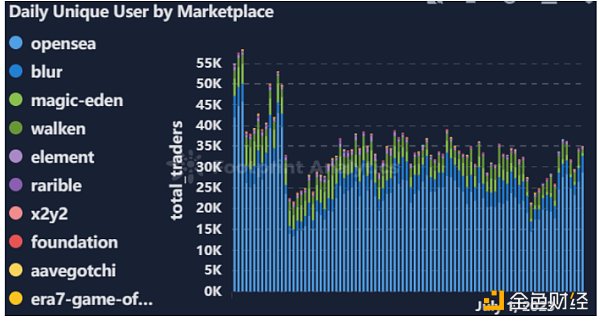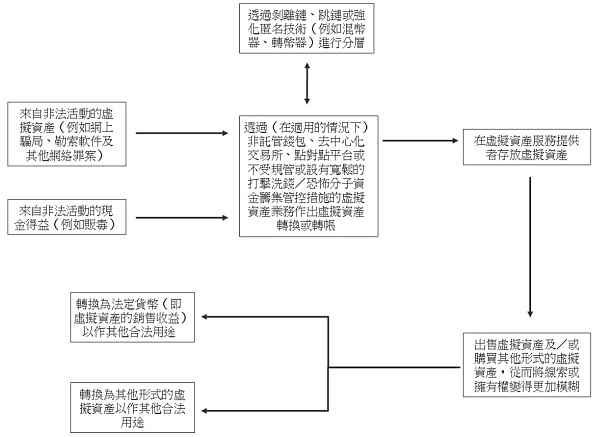Google’s major policy update Can Web3 attract a large number of Android users?
Can Web3 attract Android users after Google's policy update?Author: Meta Era, Kaishek
1. Introduction to Google Play Policies
As the largest Android app store, Google Play has billions of users and offers over 2 million mobile apps and games. However, as of July 12, 2023, Google has updated its Google Play store policies regarding NFTs and blockchain games, making some important changes:
– Google announced updates to the Play Store policies, allowing apps and games that include NFTs to enter the platform.
– The new regulations require games that use tokenized assets to clearly indicate their use of blockchain elements.
- Must-read in the Evening | Key Policy Elements for Cryptocurrency Assets
- SEC New Regulation Listed Cryptocurrency Companies Must Disclose Significant Cybersecurity Incidents
- The U.S. House Financial Services Committee passes the U.S. Stablecoin Regulation Bill.
– To protect user rights, Google will prevent developers from exaggerating the potential earnings from NFTs.
– The new policy also prohibits any “loot box” mechanism that violates gambling eligibility requirements.
– Reddit collaborated with Google to develop this policy, aiming to establish a fair competitive environment that promotes user trust and responsible use of blockchain technology.
It is worth noting that Google has taken a tough stance on blockchain-based apps in the past. In 2018, Google banned cryptocurrency mining apps and has continued to enforce this ban. However, recently Google allowed decentralized data storage app ArDrive Mobile and included blockchain game Axie Infinity Origins in some markets in 2022. In addition, Google Cloud announced in April 2023 that it will help developers build applications on Polygon, expediting the startup process.
Through this change in Google Play policies, it can be seen that Google has begun actively embracing Web 3.0. What has prompted Google’s attitude change? On the other hand, Apple, as another tech giant with a leading global mobile app market, also has its own stance. What will Web 3.0 bring to Google? And how will Google influence the development of Web 3.0? We will explore these questions next.
2. Similarities and Differences in Apple and Google’s Attitudes towards NFTs
Apple, as a tech giant on the same level as Google, has policies and attitudes towards blockchain and NFTs that are also worth paying attention to. As early as October 2022, Apple clarified the restrictions and rules regarding the use of non-fungible tokens (NFTs) and blockchain games through its App Store’s new guidelines:
NFT Transactions: Apple explicitly stated that apps can use in-app purchase functionality to sell NFTs and related services, such as minting and transferring these tokens.
NFTs and Related Content: NFT assets can be browsed and used within the corresponding app, but they cannot be used to unlock additional features or content. Apple prohibits using NFTs as a means to access exclusive parts of an app, such as membership cards for entering the app.
Payment Mechanism: For NFT transactions, users must use Apple’s in-app payment mechanism. Since Apple does not support cryptocurrency payment options, this method cannot be used for payment. Apple will take up to 30% share from in-app payments. This limits the types of services involving NFTs and poses a problem for NFT pricing because in-app purchases must be made at preset prices (e.g., $14.99), which does not align with the mechanism of dynamic market pricing.
Cryptocurrency and Blockchain Games: For cryptocurrency transactions, Apple’s guidelines state that applications can provide “cryptocurrency transactions or transfers” in countries or regions where cryptocurrency exchanges are licensed and operated.
In summary, although Apple’s new policy allows NFTs to exist in the App Store, there are some important limitations, especially in terms of payment mechanisms and how NFTs interact with app content. In comparison, Google’s policy change has almost lifted all restrictions on blockchain applications, with only a few remaining limitations primarily in two aspects:
Soft Limitations: Developers must be transparent with users about tokenized digital assets. If a game or app sells or allows users to obtain tokenized digital assets, developers must clearly disclose this to players. Additionally, developers must not exaggerate any potential profits from games or trading activities or engage in related promotions that mislead players.
Hard Limitations: Chain games with “loot box” mechanics must meet Google’s gambling eligibility requirements. This limitation is relatively strict, as there are relatively few countries that legalize gambling. The “loot box” mechanic refers to the ambiguity of the value of in-game items, such as chests obtained from playing games or items or heroes classified according to rarity (e.g., based on standards like SR, SSR). This mechanic is essential in many chain games. However, if the game specifies the value of randomly dropped items such as chests and heroes, it raises issues of game economy regulation. Improper regulation can easily lead to the collapse of the economic system.
Below is a brief comparison of the blockchain policies of the IOS App Store and Google Play:

Table: Comparison of blockchain policies between the IOS App Store and Google Play
III. Google Play’s Development and Changing Attitude Towards Blockchain
What prompted Google Play to change its attitude towards blockchain and NFTs, and what benefits will this policy change bring to Google Play? Analyzing the history and development of Google Play, since its launch in 2012, Google Play has become one of the largest mobile app markets globally, although its user base far exceeds the iOS App Store, there is a huge gap in revenue and consumer spending. For example, in the first half of 2022, Google Play generated approximately $21.3 billion in revenue through in-app purchases and subscriptions, a 7.4% decrease compared to the same period in 2021. In contrast, in the first half of 2022, the iOS App Store generated approximately $43.7 billion in revenue through in-app purchases and subscriptions, a 5.6% increase compared to the same period in 2021.
The reasons can be summarized as follows:
– iPhone users have stronger purchasing power.
– Apple’s policies and commission system. Apple charges a 30% commission, forcing developers to increase the prices of iOS applications. In contrast, Google Play has a lower commission of 15%.
– iOS users are more willing to pay for applications, resulting in a larger number of top-tier applications on iOS compared to Android. For example, in the first quarter of 2019, the revenue from the iOS App Store was 1.48 times that of Android. Top developers also earn 64% more income from iOS compared to Android.
– Revenue from gaming categories on iOS is higher, as gaming users spend more compared to other categories of applications.

Table: Comparison of Blockchain Policies between IOS App Store and Google Play
Allowing blockchain applications to be listed may help to some extent in compensating for the disadvantages of Google Play:
1. NFT, as a non-fungible token, naturally has the function of collecting royalties. Top developers who release applications on Google Play with NFT assets can significantly increase their income.
2. Even though the cryptocurrency market is currently in a bearish trend, the market value of Ethereum NFT alone is close to $6 billion, and when combined with the market value of NFTs on other chains such as Bitcoin, Solana, and Polygon, it should exceed $7 billion. When the cryptocurrency market recovers, the market value will multiply.
3. GameFi is one of the largest financing tracks in the blockchain field, which will to some extent increase the proportion of gaming revenue on Google Play.
IV. Impact on the Blockchain Industry
Compared to the billions of users on Google Play, the number of users in the entire Web 3.0 world is only a fraction, not to mention NFT and GameFi.

Figure: Daily Active Users of Blockchain Games Source: Footprint

Figure: Number of Blockchain Games Source: Footprint

Figure: Number of Active Blockchain Games Source: Footprint
As of July 16, 2023, the daily average number of active GameFi accounts is about 780,000, and the total number of existing games is about 2,400, with less than 200 active games.

Figure: Daily Average Number of NFT Transaction Addresses Source: Footprint
As of July 18, 2023, the daily average number of NFT transaction addresses is only 34,000.
From a long-term perspective, even if this policy change by Google Play can only bring about a 0.1% conversion for NFT and GameFi, it will still achieve a multiple growth in the user base of NFT and GameFi. Although Google Play’s policy also restricts the hype and false advertising of blockchain applications, it is believed that it can still bring a large number of new users to the blockchain field, especially to blockchain games, when the bull market returns, because GameFi users have many similarities in terms of geographical distribution and mobile device distribution compared to Google Play.
Regional Distribution:
-
The largest proportion of users is in Southeast Asia, with Southeast Asian users accounting for 41% in the first half of 2022.
-
Next are users from North America and Western Europe, accounting for 16% and 15% respectively in the first half of 2022.
-
The proportion of users in developing countries is also growing rapidly, such as the Philippines, Vietnam, India, etc.
Device Distribution:
-
iOS device users account for approximately 15%, while Android device users account for approximately 85%.
-
Mobile users account for the majority, accounting for approximately 95%, while PC users account for only about 5%.
-
Mobile devices are mainly dominated by low-end and mid-range models.
In summary, the fact that Google Play allows blockchain games and NFT applications to enter the platform signifies the broader application of blockchain technology on mainstream platforms and is of great significance. Google’s attitude has shifted from past prohibitions to openness and inclusiveness towards blockchain applications, opening the door for the development of blockchain games and NFT applications on the Google Play platform. Developers can now use digital assets to create a more immersive user experience, such as using NFTs to represent game content owned by users, which will promote innovation in blockchain games. At the same time, Google has a large user base and strong traffic support, providing developers with a new platform and channel to expand blockchain applications globally, accelerating the globalization of blockchain game applications.
References
[1]https://android-developers.googleblog.com/2023/07/new-blockchain-based-content-opportunities-google-play.html
[2]https://www.nbcnews.com/tech/crypto/apple-tightens-rules-crypto-nfts-app-store-rcna53905
[3]http://www.gamelook.com.cn/2022/07/489251
[4]https://finance.sina.com.cn/stock/usstock/c/2019-06-19/doc-ihytcitk6331429.shtml
[5]https://cn.cointelegraph.com/news/2022-gamefi-industry-report
[6]https://mirror.xyz/0x64e3CA260E244e43CBA1b0Eb1950F413BA900933/7SbNRxhYXCzp6wwZ2vH-7K0AdnauKqgrf1VSnPZ1V4o
We will continue to update Blocking; if you have any questions or suggestions, please contact us!
Was this article helpful?
93 out of 132 found this helpful
Related articles
- LianGu Air Paradigm What principles should be followed in formulating stablecoin policies?
- Latest Proposal from Both Parties in the United States DeFi and Crypto ATMs Also Need AML and KYC
- Global NFT Tax Regulation Policies Overview, Comparison, and Outlook
- “Responsible Financial Innovation Act” to be submitted. What’s new about the new bill?
- Comprehensive interpretation of the Metaverse industry policy: Who are the leaders of the policies?
- Hong Kong sets up Web3 development task force, will it become the next Crypto hub?
- Interpreting the digital asset bill that may be introduced before the 24th US presidential election






